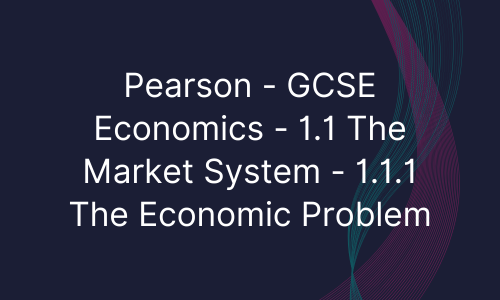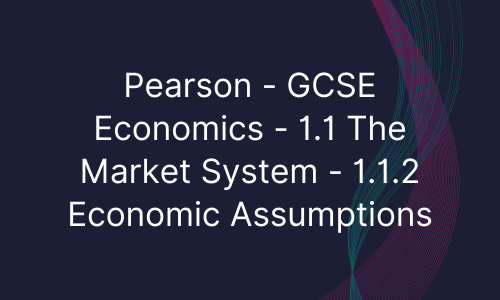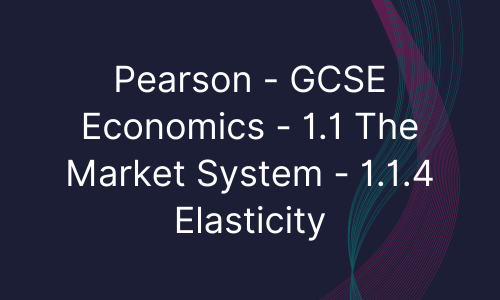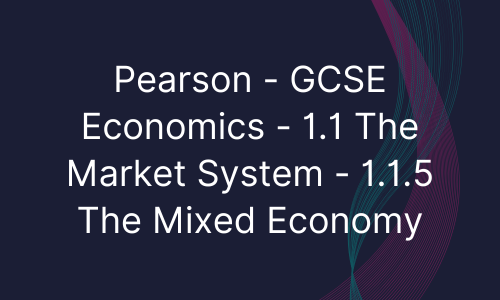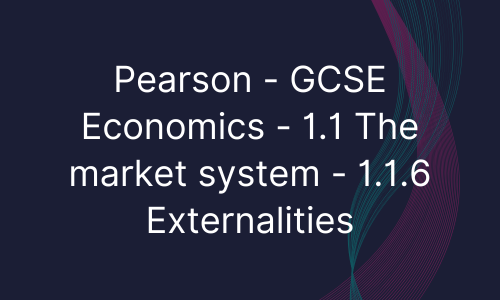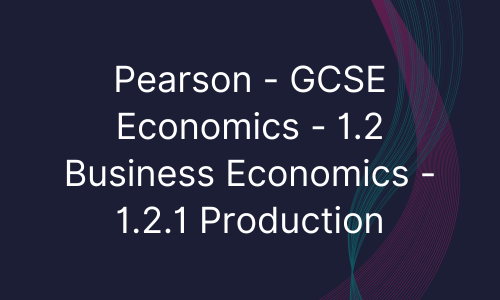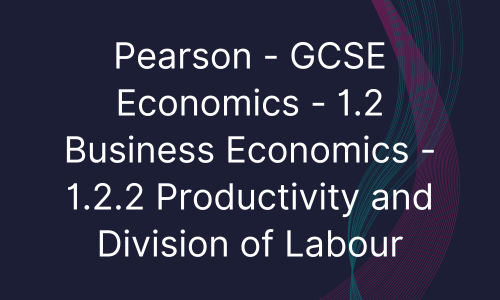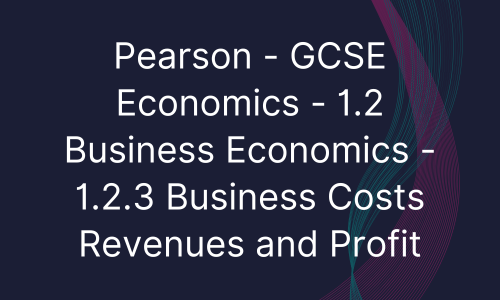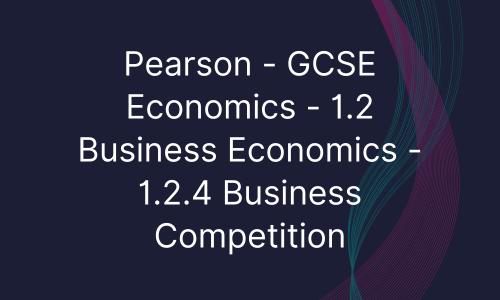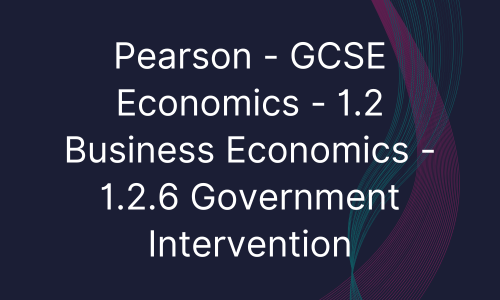Pearson Edexcel GCSE Economics (1EC0) Syllabus: Your Comprehensive Guide
Lessons, Resources & Insights
Pearson Edexcel GCSE Economics (1EC0) Syllabus: Your Comprehensive Guide
Lessons, Resources & Insights
Welcome to the definitive guide for the Pearson Edexcel GCSE Economics (1EC0) qualification. This page is designed to provide students, teachers, and parents with a comprehensive overview of the Edexcel GCSE Economics syllabus, a vital subject for understanding the world around us. The Pearson Edexcel GCSE Economics (1EC0) course offers a robust foundation in economic principles, preparing learners for further study and future careers. Discover how Enterprise Skills can support your journey through this engaging and highly relevant GCSE Economics qualification.
What Makes the Pearson Edexcel GCSE Economics (1EC0) Unique?
The Pearson Edexcel GCSE Economics (1EC0) stands out for its practical and contemporary approach to economic education. Unlike some other qualifications, this Edexcel Economics syllabus focuses on real-world applications, encouraging students to analyse current economic issues and their impact on individuals, businesses, and governments. This GCSE Economics guide will highlight how the qualification fosters critical thinking and problem-solving skills, making it an invaluable asset for any student. The emphasis on both micro and macroeconomics within the Pearson Edexcel GCSE Economics (1EC0) framework ensures a well-rounded understanding of the subject.
Course Structure and Assessment for Edexcel GCSE Economics
The Pearson Edexcel GCSE Economics (1EC0) is structured into two main papers, each assessing different aspects of the Edexcel Economics syllabus. Paper 1, Markets and Market Failure, covers fundamental economic concepts, while Paper 2, The National and Global Economy, delves into broader economic issues. Both papers for the Pearson Edexcel GCSE Economics (1EC0) qualification are externally assessed, featuring a mix of multiple-choice, short-answer, and extended-response questions. This structure ensures a thorough evaluation of students’ knowledge and analytical abilities within the GCSE Economics curriculum.
Skills Developed and Career Pathways with GCSE Economics
Undertaking the Pearson Edexcel GCSE Economics (1EC0) qualification equips students with a diverse set of transferable skills. Beyond a deep understanding of economic theories, students develop strong analytical, evaluative, and quantitative skills. These are highly valued in a wide array of career paths, from finance and business to journalism and public policy. The Edexcel GCSE Economics provides an excellent foundation for A-Level Economics, Business Studies, and other social sciences, opening doors to university courses in Economics, Management, and Law. For students considering their future, the Pearson Edexcel GCSE Economics (1EC0) is a strategic choice that enhances both academic and professional prospects.
At Enterprise Skills, we are dedicated to supporting students, teachers, and parents through the journey of the Pearson Edexcel GCSE Economics (1EC0). Our resources are meticulously designed to complement the Edexcel GCSE Economics syllabus, offering engaging materials, practice questions, and insightful explanations to help every learner achieve their full potential. Whether you’re a student aiming for top grades, a teacher seeking innovative teaching aids, or a parent looking to support your child’s learning, Enterprise Skills is your trusted partner for the Pearson Edexcel GCSE Economics (1EC0) qualification. Explore our tools and resources today to master the GCSE Economics curriculum.
Understanding the Pearson Edexcel GCSE Economics (1EC0) Syllabus
The Pearson Edexcel GCSE Economics (1EC0) qualification provides students with a comprehensive introduction to the fundamental principles of economics and their application to the modern world. This UK-focused GCSE course is structured to develop both theoretical understanding and practical analytical skills, preparing students for further study and informed citizenship. The syllabus is divided into two equally weighted examination papers, each focusing on distinct but interconnected areas of economic study.
Paper 1: Markets and Market Failure
The first paper introduces students to the core concepts of microeconomics, beginning with the fundamental economic problem of scarcity and the necessity of choice. Students explore how individuals, businesses, and governments make decisions in the face of limited resources, understanding the concept of opportunity cost and its implications. The course then examines the role of markets in allocating resources, using supply and demand analysis to understand how prices are determined and how markets respond to changes in economic conditions.
A significant portion of this paper focuses on market failure, where free markets fail to allocate resources efficiently. Students investigate various forms of market failure, including externalities (both positive and negative), public goods, and information gaps. For each type of market failure, students analyse the causes, consequences, and potential government interventions. The paper also examines the labour market, exploring wage determination, the impact of trade unions, and government intervention through minimum wage legislation. Students develop the ability to evaluate the effectiveness of different policy responses, considering both intended and unintended consequences.
Paper 2: The National and Global Economy
The second paper broadens the perspective to macroeconomics, examining the performance and management of the UK economy within a global context. Students learn about the key macroeconomic objectives that governments pursue, including economic growth, low unemployment, price stability, and a balanced current account. The course explores how these objectives are measured, the challenges involved in achieving them, and the potential conflicts between different policy goals.
Students examine the main instruments of government policy, including fiscal policy (taxation and government spending), monetary policy (interest rates and quantitative easing), and supply-side policies (aimed at improving the productive capacity of the economy). For each policy instrument, students analyse how it works, its potential effectiveness, and its limitations. The paper also explores the global economy, investigating the benefits and drawbacks of international trade, the role of exchange rates, and the impact of globalisation on different economic stakeholders. Students develop the ability to apply economic concepts to contemporary issues, from Brexit to climate change, and to evaluate competing perspectives on economic policy.
Developing Essential Economic Skills
Throughout the Pearson Edexcel GCSE Economics (1EC0) course, students develop a range of valuable skills that extend far beyond the examination hall. These include analytical skills (applying economic concepts to real-world situations), evaluative skills (weighing up costs and benefits and making informed judgements), quantitative skills (calculating and interpreting economic data), and communication skills (presenting economic arguments clearly and persuasively). The qualification provides an excellent foundation for further study in economics, business, and related subjects at A Level and beyond, and develops the critical thinking and problem-solving abilities that are highly valued by universities and employers. Our resources are designed to support your learning journey, making complex economic ideas accessible and engaging, and helping you to achieve your full potential in this fascinating and relevant subject.

